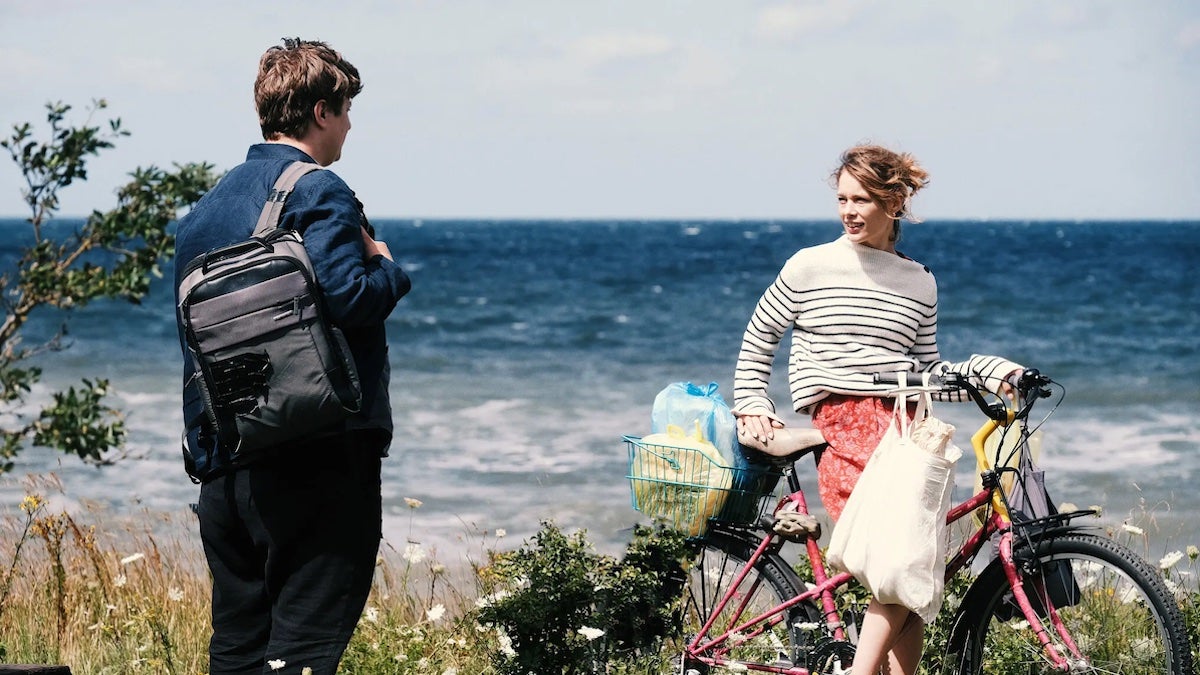
Few movies this year will be as quietly sizzling as German filmmaker Christian Petzold’s “Afire,” a novelistic and sophisticated character study that kindles inside a chamber piece, as languid as a relaxed summer day and as heartbreaking as the end of a short-lived summer love.
The unhurried, romantic undertones of “Afire” are elements we came to expect from Petzold’s recent cinema, through the likes of “Barbara,” “Phoenix,” “Transit,” and “Undine” where affecting melancholy runs freely and cinematically alongside a dose of tragedy. This vibe is more or less the atmosphere of “Afire,” which follows two friends—Thomas Schubert’s grumpily petty novelist Leon and Langston Uibel’s chipper photographer/artist Felix—as they head to Felix’s family summer home by the Baltic coast for a seaside break, and maybe for some inspiration and light work on the side.
You could be forgiven to think you’re perhaps settling in for a Michael Haneke-esque thriller or an ‘80s American slasher flick when the duo’s car breaks down by the woods on their way to the cabin, requiring the pair to drag themselves and their luggage through the wilderness to reach the modest and secluded home. One of the most inventive filmmakers working today, Petzold doesn’t quite go there, but that doesn’t mean a supposedly unpleasant surprise (in addition to fast-approaching wildfires) isn’t waiting for the unsuspecting friends.
That surprise element is Nadja (terrific Petzold regular Paula Beer, returning for her third movie with the auteur), a friend of Felix’s mother spending the summer in the same house, whose presence she had conveniently forgotten to tell Felix about. An ice-cream seller by day and a passionate moaner between the bedsheets by night—Nadja dates the local lifeguard who joins her in the evenings—she gets on Leon’s nerves fast despite being a friendly roommate, a good cook and generally pleasant company. But when it comes to Leon, as unpleasant, self-absorbed and pretentious as tortured artists come, those qualities prove to be easy to overlook.
In fact, Leon is incapable of seeing anything around him, as we swiftly learn. Gently and lovingly, Petzold has the trio settle into a tranquil routine, something that splits the difference between a lush Éric Rohmer movie and a sensual Luca Guadagnino picture. Amid that luxurious rhythm he peels back the layers of Leon, revealing underneath his hardened exterior an insecure writer who’s been so busy pretending and scolding others (including Felix) that he had forgotten to actually look, feel and observe like writers are supposed to do proficiently.
It’s a delightful surprise that Petzold does this examination of masculinity with a generous helping of humor, perhaps delivering his funniest movie yet, elevated by Schubert’s exacting performance as someone you both want to smack and lend a shoulder to cry on. In that regard, it’s not that “Afire,” a film that eventually culminates into a soul-crushing tragedy, is full of laugh-out-loud jokes. But Petzold recognizes something relatable, even sympathetic in Leon through the eyes of Nadja, a literary scholar to Leon’s (and our) shock, one who notices something in him that’s waiting to be rescued but detests Leon’s working manuscript regardless. (To be fair, the hilarious title “Club Sandwich” doesn’t exactly inspire much confidence.)
But the happy-go-lucky young woman (that Beer brings to life with disarming and effortless charm) decides to lend Leon her healing touch all the same, especially when Leon’s editor (a wonderful Matthias Brandt) turns up for a work session and joins them over an eventful dinner. The film slowly starts to shift gears on the heels of this excellent scene filled with intellectualism, sensuality and silent grudges. The impending approach of devastating wildfires draw nearer with distant echoes of roaring flames and in one deeply sad incidence, the sight of a burning baby boar. (The scene is even more disturbing than it sounds and is certainly not for the squeamish.)
You might feel a hint of discomfort once you realize the fate and growth that Petzold has in store for his misanthropic author character, who in the end lives by an age-old (and sometimes, ill-advised) wisdom that goes, “write what you know.” But on the other hand, isn’t surviving various shades of traumas and catastrophes how humans mature and deepen? Something tells this critic that Petzold knows this on a deep, personal level, pouring that experience into a complex film as intense and haunting as a summer rainstorm.















